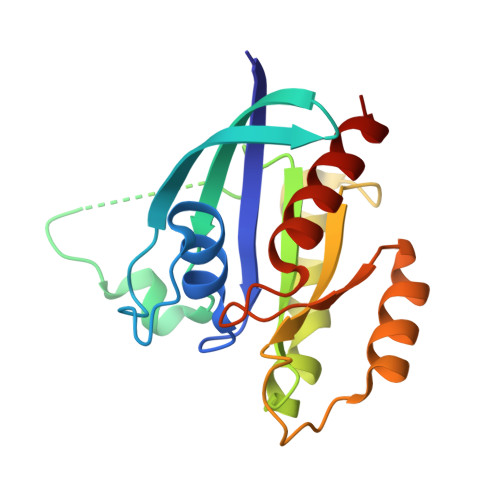RASinternal tandem duplication disrupts GTPase-activating protein (GAP) binding to activate oncogenic signaling.
Nelson, A.C., Turbyville, T.J., Dharmaiah, S., Rigby, M., Yang, R., Wang, T.Y., Columbus, J., Stephens, R., Taylor, T., Sciacca, D., Onsongo, G., Sarver, A., Subramanian, S., Nissley, D.V., Simanshu, D.K., Lou, E.(2020) J Biological Chem 295: 9335-9348
- PubMed: 32393580
- DOI: https://doi.org/10.1074/jbc.RA119.011080
- Primary Citation of Related Structures:
6PQ3, 6WGH - PubMed Abstract:
The oncogene RAS is one of the most widely studied proteins in cancer biology, and mutant active RAS is a driver in many types of solid tumors and hematological malignancies. Yet the biological effects of different RAS mutations and the tissue-specific clinical implications are complex and nuanced. Here, we identified an internal tandem duplication (ITD) in the switch II domain of NRAS from a patient with extremely aggressive colorectal carcinoma. Results of whole-exome DNA sequencing of primary and metastatic tumors indicated that this mutation was present in all analyzed metastases and excluded the presence of any other clear oncogenic driver mutations. Biochemical analysis revealed increased interaction of the RAS ITD with Raf proto-oncogene Ser/Thr kinase (RAF), leading to increased phosphorylation of downstream MAPK/ERK kinase (MEK)/extracellular signal-regulated kinase (ERK). The ITD prevented interaction with neurofibromin 1 (NF1)-GTPase-activating protein (GAP), providing a mechanism for sustained activity of the RAS ITD protein. We present the first crystal structures of NRAS and KRAS ITD at 1.65-1.75 Å resolution, respectively, providing insight into the physical interactions of this class of RAS variants with its regulatory and effector proteins. Our in-depth bedside-to-bench analysis uncovers the molecular mechanism underlying a case of highly aggressive colorectal cancer and illustrates the importance of robust biochemical and biophysical approaches in the implementation of individualized medicine.
- Department of Laboratory Medicine & Pathology, University of Minnesota, Minneapolis, Minnesota, USA nels2055@umn.edu dhirendra.simanshu@nih.gov emil-lou@umn.edu.
Organizational Affiliation:



















